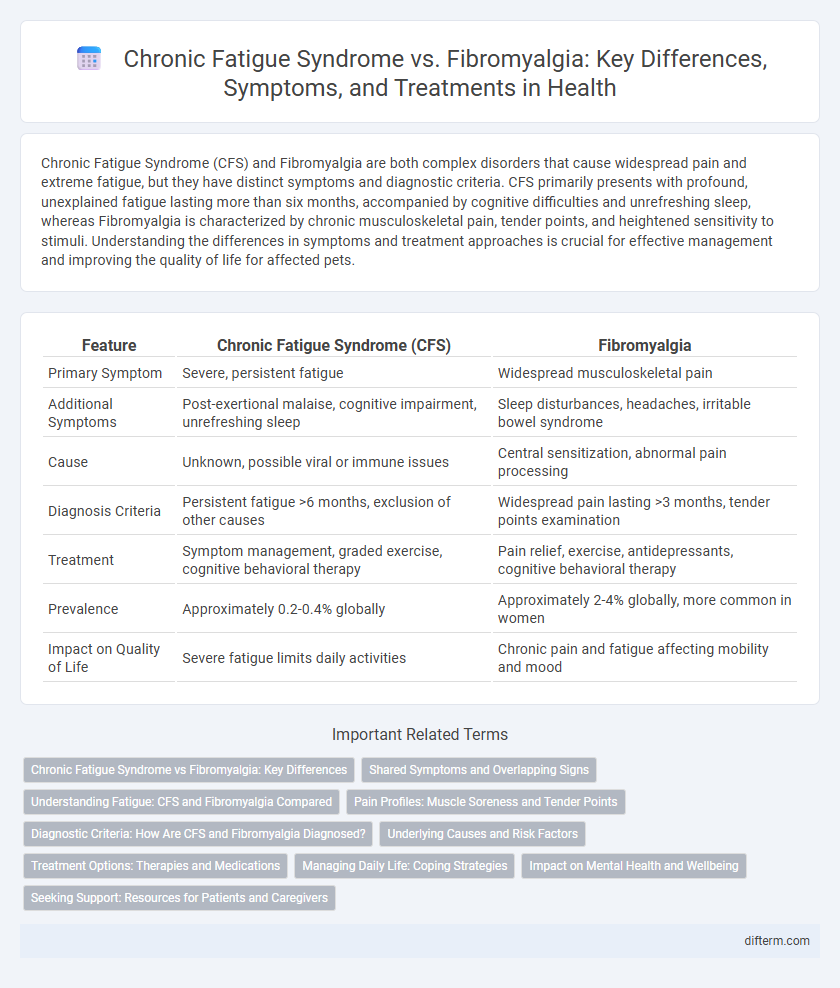Chronic Fatigue Syndrome (CFS) and Fibromyalgia are both complex disorders that cause widespread pain and extreme fatigue, but they have distinct symptoms and diagnostic criteria. CFS primarily presents with profound, unexplained fatigue lasting more than six months, accompanied by cognitive difficulties and unrefreshing sleep, whereas Fibromyalgia is characterized by chronic musculoskeletal pain, tender points, and heightened sensitivity to stimuli. Understanding the differences in symptoms and treatment approaches is crucial for effective management and improving the quality of life for affected pets.
Table of Comparison
| Feature | Chronic Fatigue Syndrome (CFS) | Fibromyalgia |
|---|---|---|
| Primary Symptom | Severe, persistent fatigue | Widespread musculoskeletal pain |
| Additional Symptoms | Post-exertional malaise, cognitive impairment, unrefreshing sleep | Sleep disturbances, headaches, irritable bowel syndrome |
| Cause | Unknown, possible viral or immune issues | Central sensitization, abnormal pain processing |
| Diagnosis Criteria | Persistent fatigue >6 months, exclusion of other causes | Widespread pain lasting >3 months, tender points examination |
| Treatment | Symptom management, graded exercise, cognitive behavioral therapy | Pain relief, exercise, antidepressants, cognitive behavioral therapy |
| Prevalence | Approximately 0.2-0.4% globally | Approximately 2-4% globally, more common in women |
| Impact on Quality of Life | Severe fatigue limits daily activities | Chronic pain and fatigue affecting mobility and mood |
Chronic Fatigue Syndrome vs Fibromyalgia: Key Differences
Chronic Fatigue Syndrome (CFS) primarily manifests as persistent, unexplained fatigue lasting six months or more, often accompanied by cognitive difficulties and unrefreshing sleep, whereas Fibromyalgia is characterized by widespread musculoskeletal pain, tender points, and fatigue. CFS diagnosis involves ruling out other causes of fatigue and generally lacks specific biomarkers, while Fibromyalgia diagnosis relies on tender point examination and patient-reported widespread pain. Both conditions share overlapping symptoms but differ in primary clinical features and diagnostic criteria, necessitating tailored approaches to treatment and management.
Shared Symptoms and Overlapping Signs
Chronic Fatigue Syndrome (CFS) and Fibromyalgia share significant overlap in symptoms such as persistent fatigue, widespread musculoskeletal pain, and disrupted sleep patterns. Both conditions frequently exhibit cognitive difficulties, often referred to as "brain fog," alongside headaches and sensitivity to stimuli like light and sound. These shared clinical features contribute to challenges in differential diagnosis and necessitate comprehensive patient evaluation for accurate treatment planning.
Understanding Fatigue: CFS and Fibromyalgia Compared
Chronic Fatigue Syndrome (CFS) and Fibromyalgia both involve persistent fatigue, but the nature and underlying causes differ significantly. CFS is primarily characterized by profound, unexplained fatigue that worsens with physical or mental activity and is often accompanied by cognitive difficulties and sleep disturbances. In contrast, Fibromyalgia features widespread musculoskeletal pain alongside fatigue, sleep issues, and tenderness, with fatigue often linked to poor sleep quality and pain-related fatigue cycles.
Pain Profiles: Muscle Soreness and Tender Points
Chronic Fatigue Syndrome (CFS) primarily involves widespread muscle soreness and persistent fatigue, while Fibromyalgia is characterized by distinct tender points that cause localized pain and heightened sensitivity. Fibromyalgia patients often report pain in specific anatomical sites, such as the neck, shoulders, and lower back, whereas CFS-related muscle soreness tends to be more diffuse and less focal. Understanding these differing pain profiles is essential for accurate diagnosis and tailored treatment strategies in chronic pain management.
Diagnostic Criteria: How Are CFS and Fibromyalgia Diagnosed?
Chronic Fatigue Syndrome (CFS) is diagnosed based on unexplained, persistent fatigue lasting at least six months along with specific symptoms such as post-exertional malaise, unrefreshing sleep, and cognitive impairments, following the CDC or Institute of Medicine criteria. Fibromyalgia diagnosis relies on the American College of Rheumatology criteria, which include widespread musculoskeletal pain lasting more than three months and tenderness in at least 11 of 18 specific tender points on the body. Both conditions lack definitive laboratory tests, making diagnosis primarily clinical, emphasizing symptom history and exclusion of other disorders.
Underlying Causes and Risk Factors
Chronic Fatigue Syndrome (CFS) and Fibromyalgia share overlapping symptoms but differ in underlying causes and risk factors. CFS is often linked to viral infections, immune system abnormalities, and hormonal imbalances, while Fibromyalgia primarily involves central nervous system sensitization and abnormal pain processing. Genetic predisposition, stress, and trauma are common risk factors that contribute to both conditions, influencing severity and symptom manifestation.
Treatment Options: Therapies and Medications
Chronic Fatigue Syndrome (CFS) and Fibromyalgia both require multifaceted treatment strategies involving medications and therapies tailored to symptom management. Cognitive behavioral therapy (CBT) and graded exercise therapy (GET) are commonly recommended for CFS to improve energy levels and reduce fatigue. Fibromyalgia treatment prioritizes pain management through medications like pregabalin, duloxetine, and physical therapy focused on muscle strengthening and relaxation techniques.
Managing Daily Life: Coping Strategies
Chronic Fatigue Syndrome (CFS) and Fibromyalgia both require personalized coping strategies to manage daily challenges effectively, emphasizing pacing activities and prioritizing rest to reduce symptoms. Cognitive-behavioral therapy and stress management techniques serve as essential tools, improving emotional well-being and helping patients adapt their routines. Nutritional support and gentle physical exercises like yoga or swimming can also enhance energy levels and reduce pain, promoting a better quality of life.
Impact on Mental Health and Wellbeing
Chronic Fatigue Syndrome (CFS) and Fibromyalgia both significantly affect mental health and wellbeing, often leading to anxiety, depression, and cognitive impairments such as memory lapses and difficulty concentrating. Patients with CFS frequently experience profound mental exhaustion and mood disturbances, while those with Fibromyalgia report heightened emotional distress due to chronic pain and sleep disruptions. The overlapping symptoms exacerbate psychological strain, making comprehensive mental health support essential for improving quality of life in both conditions.
Seeking Support: Resources for Patients and Caregivers
Patients and caregivers managing Chronic Fatigue Syndrome (CFS) and Fibromyalgia often benefit from specialized support groups and online communities that provide shared experiences and coping strategies. Access to resources from organizations such as the Solve ME/CFS Initiative and the National Fibromyalgia Association offers educational materials, advocacy information, and guidance on symptom management. Professional counseling services and multidisciplinary care teams enhance patient outcomes by addressing physical symptoms and emotional well-being comprehensively.
Chronic Fatigue Syndrome vs Fibromyalgia Infographic

 difterm.com
difterm.com